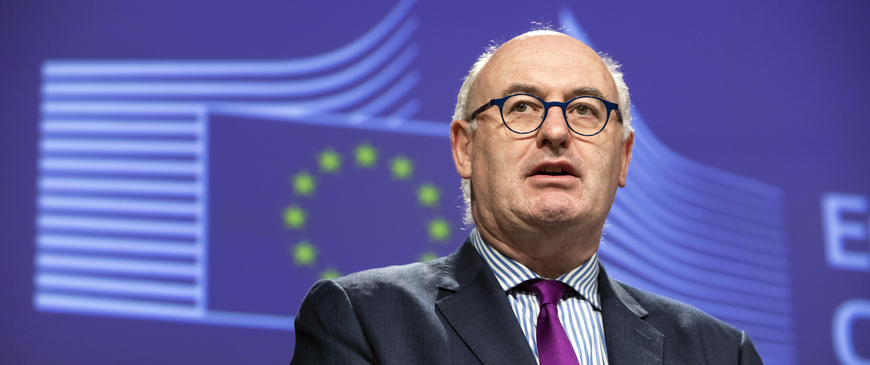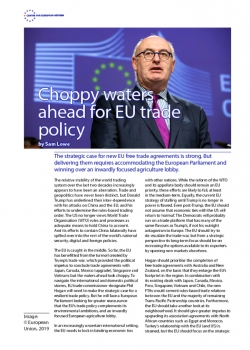
Choppy waters ahead for EU trade policy
The strategic case for new EU free trade agreements is strong. But delivering them requires accommodating the European Parliament and winning over an inwardly focused agriculture lobby.
The relative stability of the world trading system over the last two decades increasingly appears to have been an aberration. Trade and geopolitics have never been distinct, but Donald Trump has underlined their inter-dependence with his attacks on China and the EU, and his efforts to undermine the rules-based trading order. The US no longer views World Trade Organisation (WTO) rules and processes as adequate means to hold China to account. And its efforts to contain China bilaterally have spilled over into the rest of the world’s national security, digital and foreign policies.
The EU is caught in the middle. So far, the EU has benefitted from the turmoil created by Trump’s trade war, which provided the political impetus to conclude trade agreements with Japan, Canada, Mexico (upgrade), Singapore and Vietnam; but the waters ahead look choppy. To navigate the international and domestic political storms, EU trade commissioner-designate Phil Hogan will need to make the strategic case for a resilient trade policy. But he will face a European Parliament looking for greater reassurance that the EU’s trade policy complements its environmental ambitions, and an inwardly focused European agriculture lobby.
Phil Hogan will need to make the strategic case for a resilient trade policy. But he will face a European Parliament looking for greater reassurance that the EU’s trade policy complements its environmental ambitions.
In an increasingly uncertain international setting, the EU needs to lock in binding economic ties with other nations. While the reform of the WTO and its appellate body should remain an EU priority, these efforts are likely to fail, at least in the medium-term. Equally, the current EU strategy of stalling until Trump is no longer in power is flawed. Even post-Trump, the EU should not assume that economic ties with the US will return to ‘normal’. The Democrats will probably run on a trade platform that has many of the same flavours as Trump’s, if not his outright antagonism to Europe. The EU should try to de-escalate the trade war, but from a strategic perspective its long-term focus should be on increasing the options available to its exporters by opening new markets elsewhere.
Hogan should prioritise the completion of free trade agreements with Australia and New Zealand, on the basis that they enlarge the EU’s footprint in the region. In combination with its existing deals with Japan, Canada, Mexico, Peru, Singapore, Vietnam and Chile, the new FTAs would cement rules-based trade relations between the EU and the majority of remaining Trans-Pacific Partnership countries. Furthermore, the EU should take another look at its neighbourhood. It should give greater impetus to upgrading its association agreements with North African countries such as Egypt and Morocco. Turkey’s relationship with the EU (and US) is strained, but the EU should focus on the strategic importance of its ties with Ankara, and look again at upgrading its customs union with Turkey.
One of the long-running obstacles to EU liberalisation efforts has been the EU farming lobby, which benefits massively from EU trade agreements while at the same time opposing most of them. Hogan is well placed to navigate the sensitive politics, being both from Ireland (a country with a vocal agriculture sector) and the former EU commissioner for agriculture, where he developed a reputation as a tough but sensible negotiator.
Hogan will not find it easy to bring the increasingly climate-conscious European Parliament onside, but it is possible. As I argued in a recent CER paper, the EU should explore the possibility of a border carbon tax, but approach the issue with care to avoid inflaming international tensions further. Hogan should also consider beefing up the enforceability of the environment and labour commitments in EU trade agreements. While doing so might make trade partners slightly more reluctant to strike FTAs, it could lead to increased public and parliamentary buy-in, making ratification more straightforward.
One concession Hogan will be forced to make is on the planned EU association agreement with the Mercosur trading bloc members Brazil, Argentina, Paraguay and Uruguay. He would be wise to put the agreement on the backburner and avoid pushing for ratification until political conditions are more conducive to success. The Mercosur agreement makes concluding a deal with Australia and New Zealand more difficult as it also fuels European agriculture concerns about low-cost competition. Recent forest fires in the Amazon and increasing deforestation in Brazil under the Bolsonaro administration have also made the agreement a tough sell with both the European Parliament and member-states.
Phil Hogan would be wise to put the Mercosur deal on the backburner and avoid pushing for ratification until political conditions are more conducive to success.
Hogan will also find himself forced to navigate the trade-technology-national security nexus, where trade policy becomes intertwined with industrial, regulatory and defence policy – for example, on China, Huawei and 5G. He has been tasked with working with executive vice president-designate Margrethe Vestager to address some of these issues. Until the EU can present a coherent external line on questions of 5G, data localisation, industrial policy and the like, its ability to influence international discussions will be limited.
If EU trade policy is to succeed in the coming years it must become more strategic in the face of a deeply unstable international order. Hogan’s challenge is to not only communicate this vision, but also to bring the European Parliament, member-states and entrenched lobby groups along with him. Doing so will be anything but easy.
Sam Lowe, Senior research fellow, Centre for European Reform

